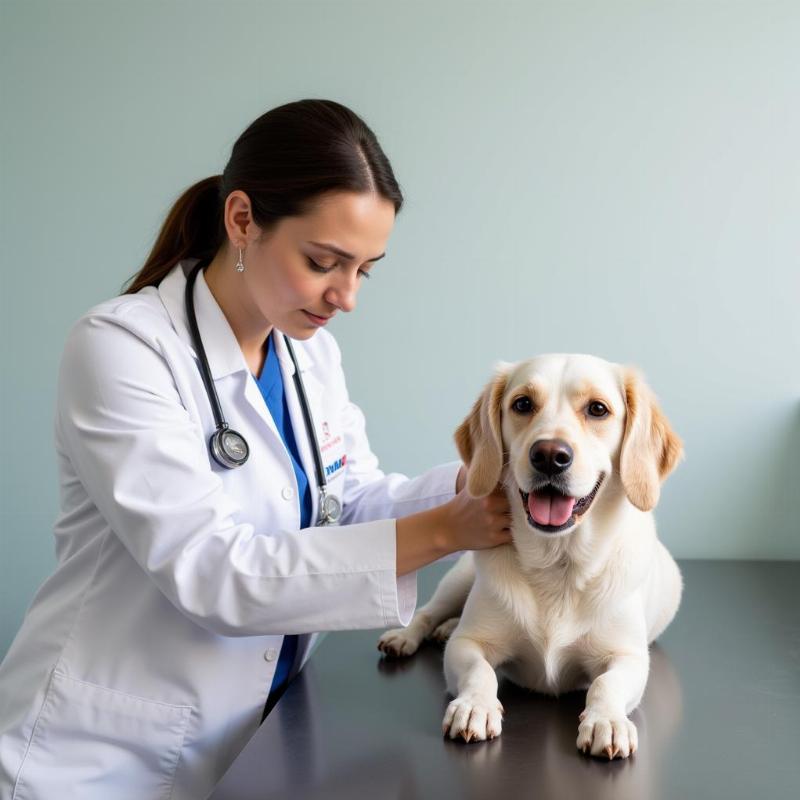If your dog is throwing up bone fragments, it’s a serious situation that requires immediate attention. This isn’t just a simple upset stomach; vomiting bone pieces can indicate several potential problems, ranging from dietary indiscretion to more severe issues like blockages or internal injuries. Understanding why your dog is throwing up bone fragments is crucial for providing the appropriate care and ensuring your furry friend’s well-being. We’ll explore the potential causes, symptoms to watch for, and what steps you should take to address this alarming issue.
Why is My Dog Throwing Up Bone Fragments?
Several factors can contribute to a dog throwing up bone fragments. One of the most common reasons is simply that they ate bones that were too hard or splintered easily. Cooked bones, especially poultry bones, are notorious for this. They become brittle and can shatter into sharp fragments when chewed, leading to digestive upset and vomiting. Another possibility is that your dog has a blockage in their digestive tract. A bone fragment can become lodged, preventing food from passing through and causing vomiting. This can be a life-threatening situation if not addressed promptly. Additionally, underlying medical conditions such as inflammatory bowel disease or pancreatitis can also contribute to vomiting, sometimes accompanied by bone fragments if the dog has recently consumed bones.
Recognizing the Symptoms: More Than Just Vomiting
While vomiting bone fragments is a clear sign of a problem, it’s essential to watch for other accompanying symptoms. These can provide clues to the underlying cause and severity of the issue. Look for signs like lethargy, loss of appetite, abdominal pain or distension, constipation, or diarrhea. Bloody vomit or stools are particularly concerning and warrant immediate veterinary attention. If your dog exhibits any of these symptoms alongside vomiting bone fragments, it’s crucial to contact your veterinarian immediately.
What to Do if Your Dog Throws Up Bone Fragments
First and foremost, stop giving your dog any more bones. If the vomiting is infrequent and your dog otherwise seems fine, monitor them closely for any changes in behavior or additional symptoms. However, if the vomiting is persistent, severe, or accompanied by other concerning signs, seek immediate veterinary care. Your veterinarian will likely conduct a physical examination and may recommend diagnostic tests such as X-rays or ultrasound to assess the digestive tract for blockages or injuries.
Preventing Bone Fragment Vomiting: Safe Chewing Options
The best way to prevent your dog from throwing up bone fragments is to avoid giving them bones altogether, especially cooked ones. Opt for safer chewing alternatives such as rubber toys, nylon chews, or dental treats designed for dogs. These options satisfy their natural chewing instincts without the risk of splintering and causing internal damage. Always supervise your dog while they are chewing on anything and promptly remove any toys that become damaged or worn.
When to Call the Vet: Urgent Situations
There are specific instances where you should contact your veterinarian immediately if your dog throws up bone fragments. These include:
- Frequent and persistent vomiting
- Bloody vomit or stool
- Lethargy and weakness
- Abdominal pain or distension
- Loss of appetite
- Difficulty defecating or constipation
- Signs of dehydration
 Veterinarian Examining Dog
Veterinarian Examining Dog
Conclusion: Prioritizing Your Dog’s Digestive Health
A dog throwing up bone fragments is a serious issue that shouldn’t be ignored. By understanding the potential causes, recognizing the accompanying symptoms, and taking prompt action, you can help ensure your furry friend’s safety and well-being. Remember, prevention is always the best approach. Opt for safe chewing alternatives to bones, and always supervise your dog’s chewing activities. If you have any concerns about your dog’s digestive health, consult your veterinarian for expert advice and guidance.
FAQ:
-
What are the safest chews for my dog? Rubber toys, nylon chews, and dental treats specifically designed for dogs are generally safer alternatives to bones.
-
Can raw bones be given to dogs? While some proponents argue for raw bones, they still pose a risk of splintering and causing digestive issues. Consult your vet before giving your dog any type of bone.
-
How can I tell if my dog has a blockage? Symptoms of a blockage include vomiting, constipation, lethargy, loss of appetite, and abdominal pain.
-
Is it okay to wait and see if my dog gets better on its own? If your dog is vomiting bone fragments, it’s best to err on the side of caution and consult your veterinarian.
-
What diagnostic tests might my vet recommend? X-rays and ultrasound are common diagnostic tools used to identify blockages or injuries in the digestive tract.
-
What are some long-term effects of untreated bone fragment ingestion? Untreated blockages can lead to severe complications, including perforation of the intestines and life-threatening infections.
-
How can I prevent my dog from eating bones in the future? Keep bones out of your dog’s reach, supervise them during chewing activities, and provide safe chewing alternatives.
Beautdogs.us is your premier resource for all things dog-related in the US. We offer expert advice on dog breeds, care, and products. Whether you’re a seasoned dog owner or just starting, Beautdogs.us is your trusted source for comprehensive and engaging information on canine companionship and care. For inquiries, contact us at [email protected] or +1 501-555-7529. Visit Beautdogs.us for more!